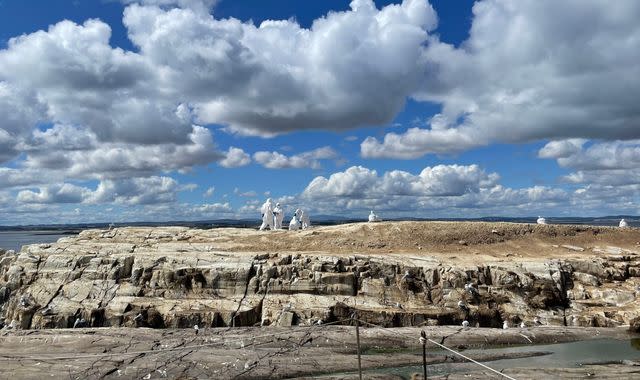Thousands of birds dying from worst ever avian flu outbreak in Northumberland

In such a beautiful place, it's an utterly horrible thing to see.
Sky News has been given rare access to the Farne Islands, just off the coast of Northumberland.
Looked after by National Trust rangers, these picturesque, uninhabited islands have been off-limits to visitors for the summer.
Rangers first detected avian flu in the seabird population at the start of nesting season, around eight weeks ago.
At first, teams were spotting just a few dead chicks.
But soon, they were seeing hundreds of carcasses - adult and baby puffins, kittiwakes, guillemots, turns and shags - lying dead on the cliff-tops.
"It's been devastating," says Gwen Potter, National Trust's Countryside Manager.
"We've been collecting thousands of birds on the islands, but really it's just the tip of the iceberg. The birds can die at sea or elsewhere along the coast, so it's really difficult to quantify.
"But we've never seen an outbreak like this."
Ranger teams, who normally count new chicks, now have the grim task of collecting their remains.
Wearing full protective suits to prevent cross-contamination, they use re-purposed litter pickers to collect the carcasses.
They are placed into bags and will be taken back to the mainland and incinerated.
Within an hour of being on the island, one of the collection teams tells me they've bagged 300 dead guillemot chicks from one smallish patch of cliff-edge.
The chicks may have died from avian flu or, also possible, from starving to death if the parent bird died from the disease.
"It's really sad," one ranger says.
"You'll often find the adult birds all go to one spot on the island to die - it's like they seem to realise that they are dying."
'This year it's more indiscriminate'
By the time they've finished, the teams have filled dozens of bags.
In total, National Trust teams estimate that 6,000 wild seabirds have died on these islands.
But this outbreak, the worst in UK history, has affected seabird colonies across the UK.
It's hit mainland poultry farms too, affecting prices of poultry products in some areas.
"What is prominent about the crisis that we're facing is that this virus is hitting a range of species," ranger Tom Hendry tell us.
"Normally you'd have one type of bird that's more affected than others, but this year it's more indiscriminate."
Avian flu outbreaks occur most years.
Although there have been cases of avian flu spreading to humans, evidence suggests the risk is limited.
But the strain that's attacked birds this year is the most severe that teams working here have ever witnessed, and the result is devastating.
The number of some of these beautiful birds is already in decline due to things like pollution, habitat loss and climate change.
The addition of this outbreak, on this scale, and at breeding time, is a terrible blow.

 Yahoo News
Yahoo News 
